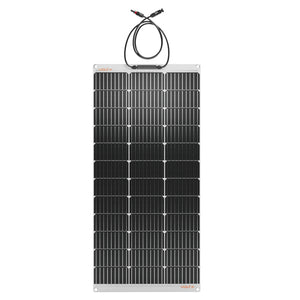Believe it or not you do not have to entirely let go of creature comforts when you are spending time outdoors and camping in Perth. This means that you need portable power sources that can power up portable appliances or at the very least, keep your campsite well lit at night. Here at Outbax, our range of portable power sources - from inverter generators to lithium batteries are highly sought after. Where else can you get quality products at affordable prices? But of all our products, it 's our solar panels that are by far the most popular. One example is our range of MaxRay flexible solar panels. If you 're buying flexible solar panels for the first time, here are a few things that would help with your purchase.
What Are Flexible Solar Panels?
Traditional solar panels are either monocrystalline, made from a silicon ingot containing a single silicon crystal, or polycrystalline, a cheaper version made from silicon wafers that contain multiple individual silicon crystals.
Polycrystalline cells are easier and cheaper to make, and so polycrystalline panels are usually a little cheaper but less efficient. The active cells of the panels themselves are typically about the width of a human hair, and rigid.
Flexible solar panels, on the other hand, are much thinner -- only a few microns wide. This thin material allows some models to bend and flex a bit.
How do flexible solar panels differ from traditional solar panels?
Currently, flexible solar panels are made from silicon, just like traditional panels. While the thinner construction allows these panels some degree of flexibility, the electrodes embedded inside are brittle, limiting their mobility.
Are thin-film solar panels and flexible solar panels the same thing?
When we talk about flexible solar panels, we're generally talking about silicon. But there are three other types of thin-film panels, which use other materials such as Cadmium Telluride, Gallium Arsenide, and Copper Indium Gallium Arsenide.
Each has different properties and different levels of flexibility and durability. Additionally, organic graphene solar panels, while also flexible, don't fall into the category of thin-film panels.
How much do flexible solar panels cost?
The actual photovoltaic material of solar panels makes up only about a third of total production cost. The remaining cost involves the bulky glass structure.
Are there advantages to flexible solar panels?
In addition to the much lower cost, flexible solar panels have wider applications. Small and lightweight, they can be used on roofs that couldn't handle the weight of traditional solar panels.
Maintenance tips for flexible solar panels
Flexible solar panels are a great product for certain applications, but the tradeoff is lower durability and a generally shorter lifespan. To maximize the life of your product, follow these tips:
- Never step on them. If you 're working to mount these panels on the roof of a vehicle or structure, be careful to not step on them. While it might seem like they 're durable enough, stepping on silicon solar cells can cause invisible microcracks that compromise the energy production and longevity of the product.
- Store them when not in use because UV light and exposure to the elements will degrade your panels over time. If you 're mounting these on a vehicle, consider using velcro to secure them to the roof so that you can easily remove and store them when not needed.
- Even though they 're bendable, avoid bending them as much as possible. These solar panels are flexible within limits, but they will eventually crack if stressed too far. To minimize the risk of damage, handle them carefully and flex them only as much as needed to fit the surface that you 're installing them onto.
- Store them gently. For similar reasons, you want to store these panels gently. Keep them flat and don 't stack anything on top of them.
- Clean them periodically. To maximize power performance, keep these panels clean. Be sure to remove any bird droppings that land on them, which can have a corrosive effect on the plastic. Clean them gently with plain water to avoid scratching the surface.


